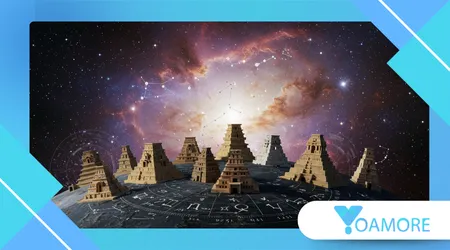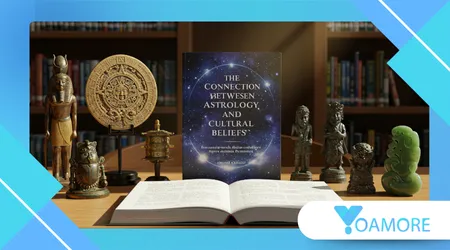Le lien entre l'astrologie et les croyances culturelles

Pendant des millénaires, le lien entre l'astrologie et les croyances culturelles a tissé une riche tapisserie à travers l’histoire de l’humanité.
Annonces
Cet article explore comment les mouvements célestes ont influencé diverses sociétés, des empires anciens aux pratiques modernes, façonnant tout, des rituels religieux à l'identité personnelle.
Nous nous pencherons sur le rôle fondamental de l’astrologie, ses expressions variées dans différentes cultures et l’attrait psychologique durable qu’elle exerce sur de nombreuses personnes aujourd’hui.
Déverrouiller la sagesse ancienne : un plan céleste
Depuis l’aube de la civilisation, les peuples anciens se tournaient vers les étoiles pour trouver des conseils et du sens.
Ces corps célestes n’étaient pas seulement des lumières lointaines ; ils étaient considérés comme de puissantes divinités ou des messagers divins.
Annonces
Cette croyance a donné naissance à la lien entre l'astrologie et les croyances culturelles, les constellations devenant un calendrier cosmique et un guide pour l'agriculture, les festivals et même la guerre.
Dans l’ancienne Mésopotamie, les Babyloniens furent les pionniers de cette pratique, suivant méticuleusement les mouvements planétaires.
Ils créaient des cartes du ciel détaillées pour prédire les changements saisonniers et deviner la volonté des dieux. Cette pratique a jeté les bases des futurs systèmes astrologiques.
La civilisation égyptienne a également profondément intégré l'astrologie à sa vie religieuse et quotidienne. L'alignement de la crue annuelle du Nil avec l'étoile Sirius était un élément central de son calendrier.
Cet événement céleste était le signal d’une nouvelle année, reliant directement les cieux à la prospérité terrestre.
Les philosophes grecs ont ensuite adopté et affiné ces idées, fournissant le cadre logique et mathématique de ce que nous reconnaissons aujourd’hui comme l’astrologie occidentale.
Ils ont intégré les observations planétaires aux concepts philosophiques, renforçant ainsi davantage le lien entre le cosmos et le destin humain.
+ Bâtiments célèbres conçus pour éloigner les mauvais esprits
Traditions orientales : un rythme cosmique différent
Alors que l’astrologie occidentale est basée sur le zodiaque, de nombreuses traditions orientales ont développé leurs propres systèmes uniques.
Le lien entre l'astrologie et les croyances culturelles est tout aussi forte dans ces régions, bien qu’avec une orientation différente.
L’astrologie chinoise, par exemple, est basée sur un cycle de 12 ans de signes animaux, lié au calendrier lunaire.
Chaque animal – le Rat, le Buffle, le Tigre, etc. – est associé à des traits de personnalité et à une destinée spécifiques. Ce système est intimement lié aux concepts d'harmonie et des cinq éléments.
En Inde, l'astrologie védique, ou Jyotish, met l'accent sur le karma et le voyage de l'âme. Elle utilise un système zodiacal différent et se concentre fortement sur les périodes planétaires (dashas) et leur influence.
Ces pratiques anciennes sont encore utilisées aujourd’hui pour les décisions importantes de la vie, telles que le mariage et le parcours professionnel.
Ces systèmes distincts soulignent que le désir humain de trouver un sens au cosmos est universel.
Cependant, l’interprétation de ce sens est façonnée de manière unique par les valeurs culturelles et les fondements philosophiques.
Les étoiles sont peut-être les mêmes, mais les histoires que nous racontons à leur sujet sont remarquablement différentes.
+ Pourquoi certaines langues ont 15 mots différents pour « riz »
Le renouveau moderne de l'astrologie et son attrait psychologique

Dans le monde moderne, le lien entre l'astrologie et les croyances culturelles est passée d’une pratique sanctionnée par l’État à une quête personnelle.
Des millions de personnes utilisent aujourd'hui l'astrologie pour explorer et comprendre leur personnalité. Elle sert d'outil d'introspection et offre un cadre pour aborder les traits de personnalité et les événements de la vie.
L’essor d’Internet et des médias sociaux a rendu l’astrologie plus accessible que jamais.
Les horoscopes quotidiens, les lectures de cartes natales et la culture des mèmes ont fait découvrir cette pratique ancienne à un nouveau public plus jeune.
Cette résurgence témoigne d’un profond besoin humain de récit et d’un sentiment d’appartenance dans un monde de plus en plus complexe.
D'un point de vue psychologique, l'astrologie offre un récit convaincant sur les défis personnels. Elle peut apporter un sentiment d'ordre et de prévisibilité dans un monde chaotique.
Face aux difficultés, il peut être rassurant d’attribuer une lutte à l’influence d’un alignement planétaire difficile plutôt qu’au hasard.
C'est un réconfort puissant pour beaucoup. Une étude de 2023 du Pew Research Center a révélé que 271 adultes américains sur 3 croient en l'astrologie.
Cette découverte démontre l’attrait durable et généralisé de la guidance céleste au XXIe siècle, même parmi une population ayant un niveau élevé de connaissances scientifiques.
| Culture | Système astrologique | Croyances clés |
| Babylone antique | Astrologie sidérale | Divination planétaire pour les dirigeants et les empires. |
| L'Egypte antique | Calendrier sothique | Événements célestes liés à l'agriculture et à la renaissance. |
| Chine | Zodiaque chinois | Cycle lunaire des animaux et harmonie élémentaire. |
| Inde | Astrologie védique (Jyotish) | Karma, but de la vie et influence planétaire. |
L'influence durable sur la culture pop
Le lien entre l'astrologie et les croyances culturelles se reflète également de manière significative dans l’art et le divertissement contemporains.
Des paroles de chansons aux tendances mode, les signes du zodiaque sont omniprésents. Cette intégration dans la culture populaire a contribué à normaliser et à populariser les concepts astrologiques auprès d'une nouvelle génération.
Prenons par exemple le tube « Uranus » de la musicienne Grimes. Elle utilise des thèmes astrologiques pour explorer la technologie et le futurisme, mêlant concepts anciens et esthétique moderne.
De même, les marques de mode lancent souvent des collections inspirées du zodiaque, chaque signe ayant son propre design unique.
Cette commercialisation démontre que l'astrologie a dépassé le stade d'un intérêt de niche. Elle est désormais un symbole reconnu et un langage identitaire pour des millions de personnes.
Il fournit un raccourci simple et accessible pour exprimer sa personnalité.
+ La science derrière 8 croyances culturelles anciennes
L'analogie d'une boussole
Considérez l'astrologie non pas comme une carte magique, mais comme une boussole. Une boussole ne vous guide pas, mais elle vous aide à comprendre votre position et votre direction.
De même, l’astrologie ne dicte pas votre avenir, mais elle peut offrir un cadre d’auto-réflexion.
Il offre un langage symbolique pour explorer vos forces, vos défis et vos relations. C'est un outil pour naviguer dans votre cheminement personnel.
Le lien entre l'astrologie et les croyances culturelles a toujours servi à cette fin.
C'est un moyen pour chacun de trouver un sens à l'univers et de se sentir connecté à quelque chose de plus grand qu'eux. Qu'il soit utilisé à des fins de guidance spirituelle ou de compréhension personnelle, son rôle est de nous aider à trouver notre voie.
Conclusion : Un dialogue cosmique
Le lien entre l'astrologie et les croyances culturelles est l’un des thèmes les plus persistants de l’histoire de l’humanité.
Des civilisations anciennes à la société moderne, les hommes ont toujours cherché des réponses dans le ciel.
L’astrologie a servi de langage pour comprendre l’univers, de guide pour la vie quotidienne et d’outil d’introspection personnelle.
C’est un exemple puissant de la manière dont nous créons du sens et trouvons des modèles dans le monde qui nous entoure.
Bien qu'il ne s'agisse pas d'une science, son impact culturel et psychologique est indéniable. Il demeure un domaine d'étude riche et fascinant.
Pourquoi continuons-nous à chercher des réponses dans les étoiles, même à une époque où les connaissances scientifiques sont sans précédent ?
C’est peut-être parce que le besoin humain de connexion – à nous-mêmes, aux autres et au cosmos – reste aussi constant que les corps célestes au-dessus de nous.
Pour plus d'informations sur la psychologie culturelle et son lien avec les systèmes de croyances, consultez cet ouvrage complet. article sur la psychologie culturelle de la Association américaine de psychologie.
Questions fréquemment posées
L'astrologie est-elle une science ?
L'astrologie n'est pas considérée comme une science, car elle ne repose pas sur une méthode scientifique. C'est un système de croyances qui interprète les mouvements célestes pour éclairer les affaires humaines. Aucune preuve empirique ne vient étayer ses affirmations.
Pourquoi tant de gens croient-ils à l’astrologie ?
De nombreuses personnes sont attirées par l'astrologie pour des raisons psychologiques et spirituelles. Elle peut apporter réconfort, sens et compréhension des défis de la vie. Elle offre un récit à la fois personnel et cosmique.
Tous les systèmes astrologiques sont-ils identiques ?
Non, il existe de nombreux systèmes astrologiques différents à travers le monde. L'astrologie occidentale, védique et chinoise n'en sont que quelques exemples. Chaque système possède ses propres méthodes, philosophies et interprétations du cosmos.
Mon signe du zodiaque peut-il prédire mon avenir ?
L'astrologie ne prétend pas prédire votre avenir avec certitude. Elle suggère plutôt que la position des planètes au moment de votre naissance peut influencer votre personnalité et votre chemin de vie. Elle est considérée comme un outil de compréhension de soi, et non comme une prévision définitive.
Où puis-je trouver plus d’informations sur les différents types d’astrologie ? Pour des informations plus détaillées sur l'histoire de l'astrologie et ses différentes formes culturelles, vous pouvez trouver cet article sur le histoire de l'astrologie de la Encyclopédie Britannica être une ressource précieuse. Il offre un aperçu complet et bien documenté.
